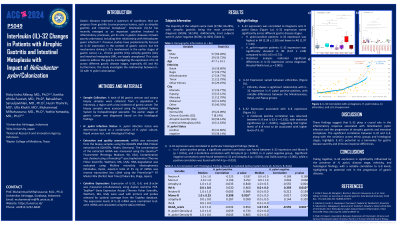Tuesday Poster Session
Category: Stomach
P5049 - Interleukin (IL)-32 Changes in Patients With Atrophic Gastritis and Intestinal Metaplasia With Impact of Helicobacter pylori Colonization
Tuesday, October 29, 2024
10:30 AM - 4:00 PM ET
Location: Exhibit Hall E

Has Audio

Muhammad Miftahussurur, MD, PhD
Universitas Airlangga
Surabaya, Jawa Timur, Indonesia
Presenting Author(s)
Ricky Indra Alfaray, MD, PhD1, Kartika Fauziah, MD, PhD2, Batsaikhan Saruuljavkhlan, MD, PhD1, Husin Thamrin, MD3, Ulfa Kholili, MD3, Muhammad Miftahussurur, MD, PhD3, Yoshio Yamaoka, MD, PhD1
1Oita University, Oita, Oita, Japan; 2National Research and Innovation Agency, Jakarta, Jakarta Raya, Indonesia; 3Universitas Airlangga, Surabaya, Jawa Timur, Indonesia
Introduction: The expression patterns of Interleukin (IL)-32 vary across different disease statuses, yet its involvement in gastric diseases remains relatively unexplored. Previous research has predominantly focused on comparing IL-32 expression between gastritis and gastric cancer, overlooking its potential significance in the development of gastric precancerous lesions. Hence, this study aims to investigate the role of IL-32 in the progression from gastric disease to precancerous lesions, while also examining the impact of Helicobacter pylori infection.
Methods: A total of 72 samples from a population with a low incidence of gastric cancer (Indonesia) were included in the study. RNA was extracted from gastric antrum tissues obtained from patients with various gastric diseases, and IL-32 expression was quantified using real-time PCR. Histopathological examination of biopsy samples was performed according to the Updated Sydney System Criteria.
Results: IL-8 expression exhibited an upward trend with disease progression, with <em>H. pylori</em> infection further amplifying IL-8 expression compared to the <em>H. pylori</em>-negative group. In the <em>H. pylori</em>-negative group, IL-32 expression was diminished during atrophy gastritis, with a subsequent recovery observed upon <em>H. pylori</em> infection. Conversely, in the <em>H. pylori</em>-positive group, IL-32 expression increased with disease progression. Histological findings such as neutrophil infiltration and atrophy scores showed associations with IL-32 expression.
Discussion: These findings underscore the intricate role of IL-32 in gastric diseases, particularly during the transition from gastritis to precancerous lesions. IL-32 expression is suppressed in <em>H. pylori</em>-negative atrophy gastritis but rebounds upon <em>H. pylori</em> infection. This dynamic regulation suggests a complex interplay in gastric pathologies, with potential implications for disease comprehension and diagnostic advancements. This study provides valuable insights, laying the groundwork for further research and clinical applications aimed at understanding immune responses and host-pathogen interactions in gastric diseases.
Disclosures:
Ricky Indra Alfaray, MD, PhD1, Kartika Fauziah, MD, PhD2, Batsaikhan Saruuljavkhlan, MD, PhD1, Husin Thamrin, MD3, Ulfa Kholili, MD3, Muhammad Miftahussurur, MD, PhD3, Yoshio Yamaoka, MD, PhD1. P5049 - Interleukin (IL)-32 Changes in Patients With Atrophic Gastritis and Intestinal Metaplasia With Impact of <i>Helicobacter pylori</i> Colonization, ACG 2024 Annual Scientific Meeting Abstracts. Philadelphia, PA: American College of Gastroenterology.
1Oita University, Oita, Oita, Japan; 2National Research and Innovation Agency, Jakarta, Jakarta Raya, Indonesia; 3Universitas Airlangga, Surabaya, Jawa Timur, Indonesia
Introduction: The expression patterns of Interleukin (IL)-32 vary across different disease statuses, yet its involvement in gastric diseases remains relatively unexplored. Previous research has predominantly focused on comparing IL-32 expression between gastritis and gastric cancer, overlooking its potential significance in the development of gastric precancerous lesions. Hence, this study aims to investigate the role of IL-32 in the progression from gastric disease to precancerous lesions, while also examining the impact of Helicobacter pylori infection.
Methods: A total of 72 samples from a population with a low incidence of gastric cancer (Indonesia) were included in the study. RNA was extracted from gastric antrum tissues obtained from patients with various gastric diseases, and IL-32 expression was quantified using real-time PCR. Histopathological examination of biopsy samples was performed according to the Updated Sydney System Criteria.
Results: IL-8 expression exhibited an upward trend with disease progression, with <em>H. pylori</em> infection further amplifying IL-8 expression compared to the <em>H. pylori</em>-negative group. In the <em>H. pylori</em>-negative group, IL-32 expression was diminished during atrophy gastritis, with a subsequent recovery observed upon <em>H. pylori</em> infection. Conversely, in the <em>H. pylori</em>-positive group, IL-32 expression increased with disease progression. Histological findings such as neutrophil infiltration and atrophy scores showed associations with IL-32 expression.
Discussion: These findings underscore the intricate role of IL-32 in gastric diseases, particularly during the transition from gastritis to precancerous lesions. IL-32 expression is suppressed in <em>H. pylori</em>-negative atrophy gastritis but rebounds upon <em>H. pylori</em> infection. This dynamic regulation suggests a complex interplay in gastric pathologies, with potential implications for disease comprehension and diagnostic advancements. This study provides valuable insights, laying the groundwork for further research and clinical applications aimed at understanding immune responses and host-pathogen interactions in gastric diseases.
Disclosures:
Ricky Indra Alfaray indicated no relevant financial relationships.
Kartika Fauziah indicated no relevant financial relationships.
Batsaikhan Saruuljavkhlan indicated no relevant financial relationships.
Husin Thamrin indicated no relevant financial relationships.
Ulfa Kholili indicated no relevant financial relationships.
Muhammad Miftahussurur indicated no relevant financial relationships.
Yoshio Yamaoka indicated no relevant financial relationships.
Ricky Indra Alfaray, MD, PhD1, Kartika Fauziah, MD, PhD2, Batsaikhan Saruuljavkhlan, MD, PhD1, Husin Thamrin, MD3, Ulfa Kholili, MD3, Muhammad Miftahussurur, MD, PhD3, Yoshio Yamaoka, MD, PhD1. P5049 - Interleukin (IL)-32 Changes in Patients With Atrophic Gastritis and Intestinal Metaplasia With Impact of <i>Helicobacter pylori</i> Colonization, ACG 2024 Annual Scientific Meeting Abstracts. Philadelphia, PA: American College of Gastroenterology.
